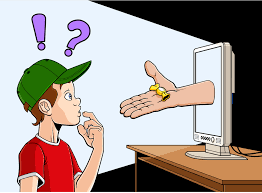
Avi Dubitzky explains how to protect our children online and some tricks in case of an emergency.
Dear Parents,
Only a parent can understand how anxious we are for the safety of our children. From the moment they are born, they won’t choke on something they put in their mouth, to the moment they start crawling and going to every corner of the house until they go to the army. This is a lifelong concern. Sometimes, we get tired and want some rest, some time for ourselves. Sometimes, we go to the movies and book a babysitter for a few hours. Since then, many things have changed; today you go to a shopping center and see parents with small children, and almost every child holds a phone or tablet in their hand so that the parents can concentrate on shopping, and it doesn’t end there. In family gatherings, the adults talk, and in the corner on the other side of the room, the children’s heads are bent over TikTok or YouTube. The pedophiles (synonymous with pedophiles) know this, and they take advantage of the plight of parents who just want some peace. Over the years, they are already connecting to WhatsApp, Instagram, and every possible application. From the outside, everything looks innocent, but that’s not how things are.
This is where the problem begins. As parents, we are happy that we have a way to achieve this peace, but this peace comes at a price that we know but sometimes choose to ignore until one day we wake up and don’t understand where it came from.
Giving our children today a phone that has unhindered internet access is like letting them go to a strip club unaccompanied on a Friday night. Of course, you wouldn’t do such a thing, but in practice, the strip club is in the palm of every child’s hand, and the age of the children who become victims is getting younger. We have already seen 9-year-old girls fall victim to sick people who are looking for them on sites that look completely innocent.

Now, I will sound like a super nanny (Michal Daliot) and tell you in the simplest way that it starts from an early age. When there is a direct and good relationship with the children, they will tell you everything. Sometimes, things you don’t want to hear, and you have to respond in the right way. Otherwise, they won’t tell you anything, not even about the man who offered you virtual money on Roblox in exchange for their phone number and revealing photos. If you are afraid to appear as if you are invading their privacy, the alternative is much more difficult for those who do not understand computers and the Internet.
- Search with the critical concept of Parental Control for various tools to prevent and control children’s exposure to sexual substances.
- Set filters to reduce the risk of receiving results containing adult material, including pornography, using search engines such as Google, Yahoo, and Bing.
- Set user privacy in the account setting on popular social media sites like YouTube and Facebook.
- Monitor the children’s activity on the Internet with the help of dedicated applications for smartphones and tablets.
- Use content filtering applications and services internet providers offer on their websites.
- In the browser settings, prevent pop-ups (pop-up windows) to reduce minors’ possibility of reaching unwanted content.
- Make sure the computer is in a central place in the house.
- Ensure the phone or tablet stays out of the children’s room at night.
- Agree with the children regarding the websites and apps suitable for them and the extent of browsing time.
- Explain to minors the dimension of the loss of control over the network: once they have clicked on the “send” button, they cannot undo it, the content cannot be deleted from the web, and the distribution of the image/video is no longer under their control.
- Instruct the minors to avoid entering personal details and identifiers in the profile and giving them in conversations.
- Instruct the children to only meet with people they met online, certainly not without parental permission.
- Teach the children that online identities can be false and instruct them not to open messages, emails, links, etc., from people they do not know.
Avi Dubitzky recommends an open and transparent relationship with your children as much as possible to prevent a future disaster.
- You will find out their password to the phone, and that they are not near the phone, just go in and check. that they are sleeping, taking a shower, or just not noticing that they left the phone unattended.
- On Android devices, it is possible to install spying and tracking software on the phone without the children’s knowledge, but when there is no knowledge of how to do it, do your homework before installing.
- And in the event that all these options do not work and there is no escape and all the lights and red flags hit you right in the face, you have to take the device without them noticing, and after they search for the device for a few hours, reassure them and tell them “we will buy you a new one.” By their behavior you can see how stressed they are by the fact that the phone is gone and that the information from it will reach others. Take the phone to an expert who will check the content and you will come to the conclusions of whether you did a wise thing or you were just stressed.
- Of course you can also evacuate children and explain to them that you are the owner of the house and you are responsible for their safety until the age of 18 and you pay the phone bill and you worry that something is wrong and ask for explanations, and the phone line will not be disconnected. It is not sure that it will work with everyone but there is no choice, you have to act responsibly since at the end of the day you are the parents and they are the children.